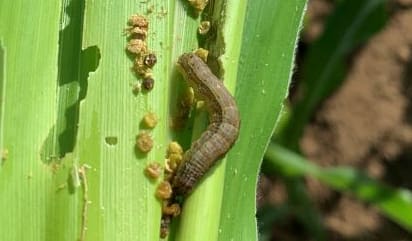
Fall armyworm damage inflicted on corn plants. (Photo: Queensland DAF)
PRODUCERS across New South Wales are on the lookout for fall armyworm (FAW) following confirmation of the pest at Hillston, Croppa Creek, Breeza, Forbes, Dubbo, Narrabri, Wee Waa, Maitland, Moree and Boggabilla.
NSW Department of Primary Industries (DPI) grains biosecurity officer, Bill Gordon, said two moths trapped at Hillston were this week confirmed as FAW and DPI was waiting for tests to confirm suspect larvae found in Hillston crops and other areas.
“The moth-trapping surveillance system, which was put in place by DPI and Local Land Services (LLS), and in-crop inspections by growers and consultants, particularly in maize and sorghum, are the first actions of an effective FAW management plan,” Mr Gordon said.
“Regular monitoring, detection and early spraying of FAW with selective insecticides when they reach recommended threshold levels, targeting instars before larvae bury themselves in leaf whorls and ears of maize, will deliver the best results.
“Growers and advisers should look for early signs of crop damage, such as windowing of leaves, as small larvae are difficult to identify. We recommend growers keep suspect larvae on host crop leaves and let them grow for a few days until they can be more easily identified.”
Control options
NSW DPI research entomologist, Lisa Bird, said parasitic wasps had been active in controlling FAW larvae.
“We are finding parasitised FAW larvae in the field and advise growers to use selective insecticide options to conserve beneficial insects and help suppress FAW as part of an integrated pest management (IPM) strategy,” Dr Bird said.
“IPM strategies help optimise FAW control costs by taking advantage of natural enemies present in crops.
“DPI has found high levels of resistance to synthetic pyrethroids in FAW and growers are advised to avoid these chemicals, which are ineffective in controlling FAW and harm beneficial insects.
“Overuse of selective insecticides could threaten Helicoverpa resistance management if there is an increase in the frequency of sprays in crops where the two species occur together. DPI has developed screening procedures closely aligned to those used in Helicoverpa to help monitor resistance in FAW.
“The use of organophosphate and carbamate chemicals is not recommended as genetic testing has indicated FAW carry markers for resistance to these chemicals. Broad-spectrum insecticides, which kill beneficial insects, are unlikely to provide effective control of FAW.”
The Australian Pesticides and Veterinary Medicines Authority has issued 37 FAW control permits, including new permits for FAW control in sweetcorn, safflower and sunflower.
Source: NSW DPI
More information on identification, treatment options and resistance management is available on DPI and LLS websites. Farmers should contact LLS staff for advice on FAW management.
In most cases, NSW DPI can identify larvae from clear photographs which can be sent via an online form or to [email protected] with your contact details or by calling NSW DPI, 1800 084 881.
See Grain Central stories:
https://www.graincentral.com/cropping/natural-predators-enlisted-in-fight-against-fall-armyworm/
https://www.graincentral.com/cropping/new-pesticides-approved-to-combat-fall-armyworm/

HAVE YOUR SAY